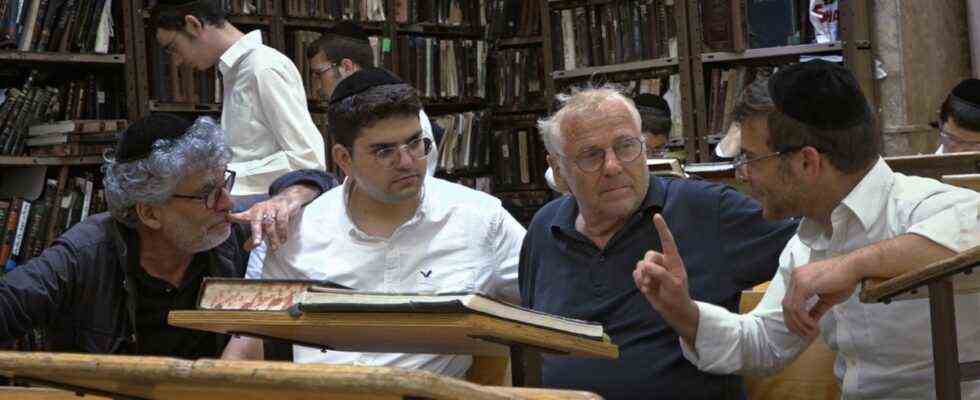The film begins with a photo of a woman who is no longer alive. Herta Cohn-Bendit, née David, was born in 1908 in what was then Posen, now Posznań, and died in London in 1963, but her son Dany calls her “Maman” in French. Her two sons are also Jews. Herta was a committed Jew, a political woman who studied law but was not religious. Her husband, the father of her children, was Erich Cohn-Bendit, a leftist lawyer who practiced in Frankfurt after the war. During the Shoah, the family was able to go into hiding in France.
This complex family history provides the motifs that unfold during the film: If you see yourself as a political person and are Jewish, but have no pious feelings and do not visit a synagogue – what then defines a Jewish identity? Is it just one entry among many in the papers or should one act on it? Can one simply be a European of the Jewish faith and no longer care about Israel? And what remains if one cannot gain anything from the religious dimension of Judaism, but is also at a distance from the Israeli government?
“If you say you are no longer a Jew, then you are still one for the anti-Semites!”
The film is an illustration of the saying by Willy Brandt, who basically explained on the subject of religion that it was a long hallway with lots of doors, each of which leads into another hallway with lots of doors. Daniel Cohn-Bendit lively opens the first of these in the discussion with his brother Gaby. He wants to determine himself what and who he is – not a religious person, but a leftist. “Everyone agrees, they tell me: Yes, you are a Jew! And I say – you go to my sack-vous m’emmerdez!” His younger brother contradicts and, in order to interrupt the flow of speech, first touches his right arm and then his left hand as well. “If you say that you are no longer a Trotskyist, no one will come and say: But you are a Trotskyist. But if you say that you are no longer a Jew, then you are still one for the anti-Semites!” And he sums it up: “We are Jews, even if I don’t know exactly what that means for me!”
So it’s not that easy to get rid of your Jewish identity, but what actually defines it? What follows from it in terms of lifestyle and worldview? And what in political terms?
These questions guide Daniel Cohn-Bendit in this film, which was shot in France and Israel. He meets Orthodox students, a devout settler in the occupied territories, but also skeptical veterans of the Israeli armed forces, a singer and many other contemporary witnesses who are sometimes completely remote from him. He does not make it easy for himself or the audience and thus imitates his own intellectual practice: Cohn-Bendit says that he sometimes develops morning thoughts on the subject, which he then counteracts again in evening considerations.
The title of the documentary is borrowed from the Paris student revolt of 1968. When Daniel Cohn-Bendit was to be declared a symbol of the unrest and was the target of anti-Semitic and xenophobic agitation, tens of thousands of students chanted: “We are all German Jews!” An ambivalent experience again, because on the one hand he was happy about the solidarity of his fellow students, on the other hand they made something different out of him, the left-wing Parisian student, namely a German Jew. “At the time I was convinced that my Judaism did not play a role in my own political identity!”
“To be Jewish means to wake up in the morning with one question and fall asleep with another in the evening.”
A good synthesis of both worlds is the socialist-inspired kibbutz movement in Israel, which unfortunately no longer plays a role in Israeli society today. The film also opens these doors: How is the left doing with Israel, how are the universalistically minded, non-religious Jews there? Naomi Bubis, the daughter of Ignatz Bubis, the chairman of the Central Council of Jews, who died in 1999, speaks out against the idea that Israel could one day become a secular republic like everyone else. She is happy to have found a home in Israel and not always to feel excluded. Another voice is that of the liberal Rabbi Nava, who advises her compatriots and co-religionists to cultivate human relationships rather than dead stones and ancient writings.
Cohn-Bendit does not make it easy for herself: One of the most moving parts of the film is the testimony of a schoolgirl from Africa who says that because of the color of her skin she is stared at like an animal, feels discriminated against and marginalized. How can the descendants of the victims of anti-Semitism be like that? Why are they building walls again? Questions that raise further questions.
This film works like a model for the exploration of identities, for dealing with the legacy and the power of attributions – regardless of whether it is of Jewish, Catholic or Communist origin. Here a dialectic of identity between self-determination and tradition is developed with a keen sense, which many people can develop individually. As an aside, it is emphasized that Judaism is more diverse than an ethno-folkloric set of music, costumes and religious practices. Rabbi Nava sums it up by quoting her pious father: “To be a Jew means waking up in the morning with one question and in the evening falling asleep with another.” In this sense, Daniel Cohn-Bendit and Niko Apel have succeeded in creating a Jewish film that is not only informative and enlightening, but also keeps viewers busy for a long time.
We are all German Jews from October 8 in the ARD media library, October 11, Das Erste, 11.35 p.m.

